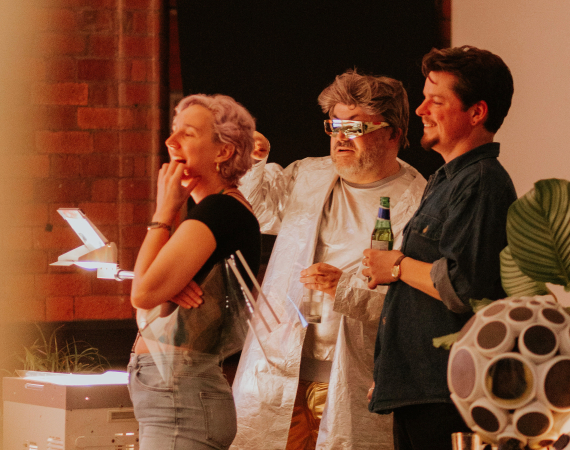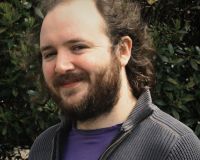Posted on Wed 28 Sep 2022
Making our Residencies Differently: an experiment with random selection
Our Winter Residencies are an opportunity for artists to explore ideas involving creative technology. In past years we’ve run a traditional selection process, but this year we’re trying something different...

2022 Winter Residency artist Alistair Gentry exhibits his British Fusion project at the Pervasive Media Studio. Photo by Manoel Bolutife Akure
Posted by

Martin O'Leary
As Head of Studio, Martin supports our community of residents in their creative and technical work.Watershed’s Winter Residencies are an opportunity for artists to explore early-stage ideas involving creative technology. Artists spend several weeks embedded in the creative community of the Pervasive Media Studio and receive support and mentoring from a Watershed producer and creative technologist.
In the past, we’ve supported work that imagines how we might live well on Mars, how we can rethink our relationship to soil, and how the world would have changed if British Rail invented nuclear fusion. This year, inspired by the work of the late David Graeber, we’re asking artists to explore the theme of Making the World Differently, to think about how we collectively make the world we live in, and how we might choose to make something better.
For our own part, we’re rethinking the way we select the artists for the residencies. In previous years, we’ve run a traditional selection process, where artists submit detailed proposals for their projects in advance, which are judged by a panel of our team and external artists. This year we’re trying something different.
We’re asking artists to submit a very simple expression of interest form, to confirm their eligibility for the residency. Hopefully this will only take a few minutes to fill out. From these expressions of interest, we’re going to draw twelve names at random. These randomly selected artists will make up our shortlist for the residency.
Each of our shortlisted artists will be invited to produce a more detailed proposal. They’ll also be paid a small stipend to visit the studio and learn more about what we’re looking for from a proposal and a project. And finally, we’ll interview each artist on the shortlist, with the interview questions available in advance. The final selection will be made by a panel of Watershed team and external artists, based on this interview and the full proposal.
One of our goals with this approach is to minimise the amount of unnecessary work that artists go through. In previous years, we’ve received detailed proposals from up to a hundred artists. We know that each of these proposals can represent days of unpaid labour, and that the odds of success are getting slimmer every year. It’s unfair to demand this much work from so many people.
We also know that there are many reasons why applicants don’t progress to interview stage, and that it’s rare to receive useful feedback if your application is rejected in the first round of a call. We want the proposal development and interview process to be useful even for those applicants who are not selected.
And finally, we know we're all subject to systematic and human biases—our hope is that by randomly selecting applicants, we’re able to give an interview to some artists who may otherwise be unfairly excluded from selection processes like this one.
We’re not the first organisation to try a system like this—we’re very much indebted to the work that Jerwood Arts have done exploring random selection. Our approach is slightly different, and we hope that by comparing the two, we can learn how to improve our own funding process and provide another example for others to draw from.
This is an experiment. There are risks, both for us and for the artists who apply. We believe that we can manage those risks, and that we’ll be able to deliver a good experience for all the artists. And we’re excited about the possibility of a radical change to how arts funding works, of reducing the amount of unpaid labour and bias in the process.
If you’re interested in being a part of this experiment, you can find details of how to apply for the residency here. Applications are open until October 31st. We look forward to hearing from you.